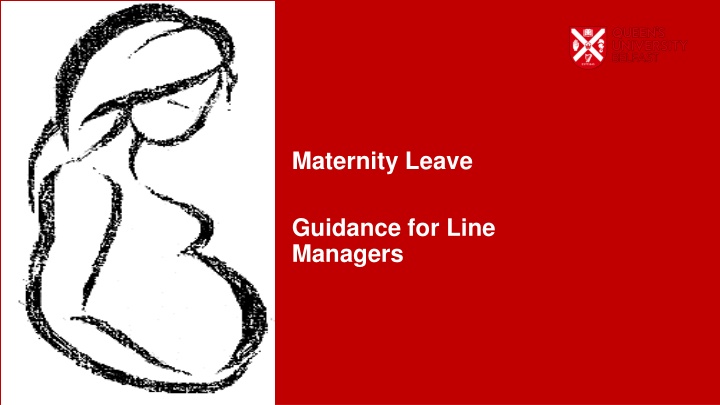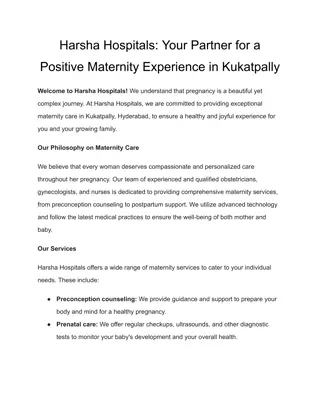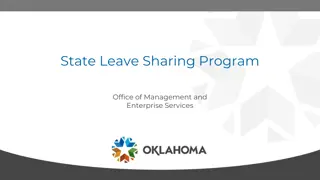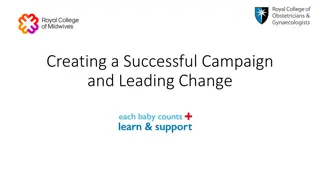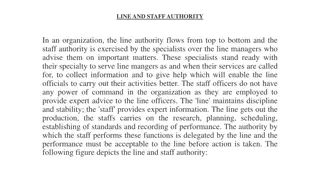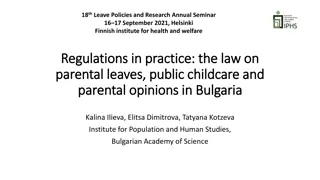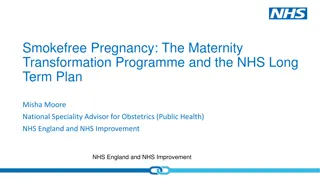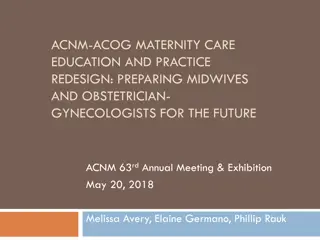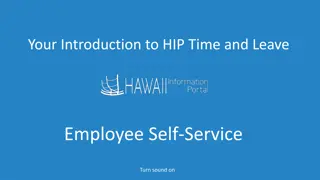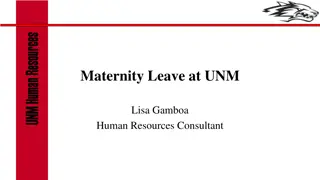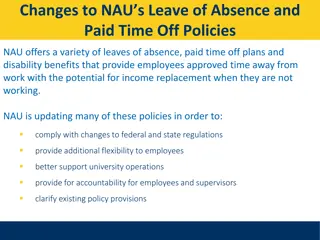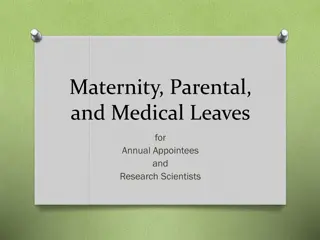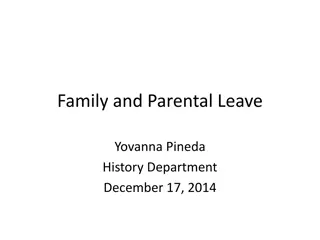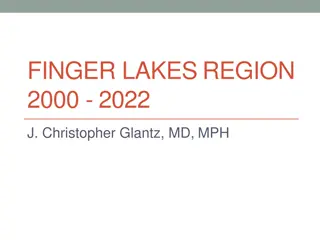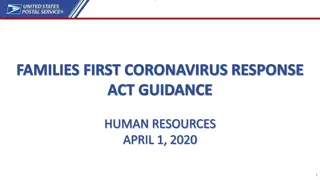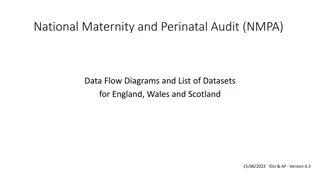Maternity Leave Guidance for Line Managers at the University
The Maternity Leave Guidance for Line Managers at the University emphasizes compassion and support for expectant mothers. It outlines essential steps for line managers before, during, and after maternity leave, including notifying HR of pregnancy, conducting risk assessments, discussing leave plans, and managing resource coverage during the absence. The document aims to equip line managers with the necessary tools to navigate this significant period of change in their employees' lives.
Download Presentation

Please find below an Image/Link to download the presentation.
The content on the website is provided AS IS for your information and personal use only. It may not be sold, licensed, or shared on other websites without obtaining consent from the author.If you encounter any issues during the download, it is possible that the publisher has removed the file from their server.
You are allowed to download the files provided on this website for personal or commercial use, subject to the condition that they are used lawfully. All files are the property of their respective owners.
The content on the website is provided AS IS for your information and personal use only. It may not be sold, licensed, or shared on other websites without obtaining consent from the author.
E N D
Presentation Transcript
Maternity Leave Guidance for Line Managers
Maternity Leave At The University we are committed to fostering a culture that is underpinned by our core values: Excellence, Respect, Ambition, Integrity and Connected. We acknowledge that whilst pregnancy may be very exciting time for expectant mothers, it may also be time filled with apprehension for a number of reasons . It is hoped this guidance will equip Line Managers with the relevant tools to manage their staff in a compassionate way during this period of change in their lives. Included is practical and essential information you will need to support your staff over three specific timeframes. Return From Leave Before Leave During Leave This guidance should be read in conjunction to the Maternity Leave Policy here: http://www.qub.ac.uk/directorates/HumanResources/annual-family-other-leave/work-life-balance-policies/
BEFORE Maternity Leave What is required from me if a member of staff notifies their pregnancy to me? A member of staff must inform the University, no later than the end of the fifteenth week before the expected week of childbirth, of the following: that she are pregnant; the week the baby is expected to be born (EWC); and when they want the maternity leave to start It is common for expectant mothers to notify their pregnancy informally before this if you are notified of a pregnancy you should firstly offer congratulations and support. Pregnancy and the announcement of it is very personal, ensure you maintain confidentiality around this, speak with the employee and find out how and when they wish to share their news with their colleagues and support them in doing this. Essential Steps: 1. Provide the employee to the Maternity Leave Procedure and the Guidance for Expectant Mothers . 2. Informally discuss proposed plans regarding maternity leave regarding commencement date and duration of leave (all staff are entitled to 52 weeks maternity leave provided their contract extends the whole duration of leave). Any conversations at this stage are subject to change. 3. Carry out a pregnancy risk assessment full guidance and templates are available on the New and Expectant Mothers Guidance, should you need any assistance with this liaise directly with Safety Services. Continue to assess the risks throughout the pregnancy. It would be good practice to schedule routine meetings with the employee to check in with them and how they are managing at work throughout the pregnancy - ensure they are aware to advise you as a matter of urgency if they are experiencing difficulties or there are health and safety concerns related to the nature of work, to allow the University the opportunity to address any work- related issues. Line Managers and Supervisors have day-to-day responsibility to ensure adequate controls are in place and are used, and for ensuring that individual risk assessments are carried out in conjunction with the expectant mother, and that the appropriate level of confidentiality is maintained. 4. Consider how you might resource the role during the maternity leave period. Discuss this with HR should you need to. A Maternity Cover Fund is in place that provides assistance to Schools and Directorates to ensure that the essential work of all members of staff who take maternity leave is covered so that they can enjoy anxiety-free maternity leave. More details on the fund is available here ensure you apply for this in line with the procedure. 5. Ensure your employee formally notifies HR of their pregnancy on the Maternity Notification Form. You will be required to sign this form to approve any annual leave also being taken. A member of staff is expected, where possible, to take their full annual leave entitlement in a particular leave year. However, should this not be possible due to maternity leave arrangements, the employee will be able to carry over up to the full complement of leave (42 days) to the next leave year, the scheduling of which must be taken by agreement with you. Annual leave may be taken at the end of OML, (where AML is not taken) or at the end of AML ACADEMIC / RESEARCH STAFF CONSIDERATIONS If your employee is on a fixed term contract they will have the same entitlements to pay and leave providing they meet the qualifying criteria. If their fixed term contract ends during their maternity leave and is not renewed, the entitlement to the enhanced University maternity pay will cease but SMP will continue to be paid. Some funding bodies are prepared to suspend or extend grants to allow for maternity leave. The Principal Investigator should check the terms and conditions of the Grant with Research Finance. Academics returning from maternity leave are entitled to a teaching free semester so that they can allocate time to re-gaining research momentum. In light of this please ensure you plan accordingly when resourcing the role.
DURING Maternity Leave Offer support to your employee during pregnancy by: KIT Days KIT days exist to allow new mothers to work for a period of up to 10 days during their maternity leave without loss of MA/SMP. They can be used on an individual basis or as blocks but are to be used by agreement in advance. Your employee will require time off to attend antenatal appointments. All pregnant employees have a statutory right to paid time off to attend these appointments and may not be in a position to provide much notice for all appointments depending on the circumstances. Have a conversation with your employee regarding forthcoming appointments to plan appropriately. There is no obligation for the employee to use a KIT day. Payment for KIT days are at a full days salary (inclusive of any SMP/MA Payments). Examples of what a KIT day could be used for for include: Departmental away days; Attend conferences; Training days; Phasing return etc Encourage your employee to take rest and lunch breaks. Make arrangements for maternity cover as soon as possible and communicate your plans with your staff member, including them in decisions wherever possible. Consider if you have any essential events that occur during your employees maternity leave and discuss if they wish to attend. A record should be retained and HR informed to make the necessary payment to the employee. Be supportive of your employee during their pregnancy and understand that plans are subject to change regarding leave dates. Your employee can change their maternity commencement date provided they give 28 days notice of doing so. Preparing and planning for return to work If your employee wants to return to work from Maternity Leave either earlier or later than first agreed, they must give the University 8 weeks' written notice of the date on which they want to return to work. Sickness is common during pregnancy, record pregnancy related sickness as such on the absence maintenance system as this does not count towards absence thresholds. Offer support to your employee if they are frequently absent due to sickness. If your employee is absent due to pregnancy related illness in the 4 weeks before the expected week of confinement the employees maternity leave will automatically commence. It is understood that returning to work after a long period of absence, and having gone through a period of personal change in their lives, can be daunting. To alleviate worries and help facilitate a smooth transition you should have a discussion with your employee in preparation for their return; items to cover could be: Ask your employee about contact arrangements when they will be on maternity leave. It is good practice to maintain reasonable contact with your staff member whilst they are on leave.Things to consider would be frequency of contact, updates to be informed about, who would initiate the routine contact and how (e.g. a phone call or email). It is what works best for the both of you. If your employee requests no contact during her maternity leave, you have a duty to keep her informed about any major changes to her working environment, e.g. restructure. The University is entitled to make reasonable contact for a number of reasons, such as to help plan and to discuss arrangements for return to work. Does the employee need anything for their return from the Department? Does the employee have any preference on how their first few days will be organised? Etc
AFTER Maternity Leave Return to work interview/checklist Continuing to breastfeed Being off on maternity leave and using annual leave entitlements could result in being away from work for upwards of 14 months undoubtedly this is a long time. It is important to ensure that your employee feels supported on their return from maternity leave. A return to work interview provides a chance for you to have an open discussion about changes that have occurred whilst your employee was off and any needs they might have to aid their settling in, things to cover include: Some mothers choose to continue breastfeeding after they return to work, or during KIT days. New mothers returning to work who wish to express milk for their baby will be accommodated with suitable facilities to express and store breastmilk. This will be arranged on an individual basis. If your employee notifies you of their intention to breastfeed please contact Safety Services and they will discuss this with you. Safety Services offer facilities such as personal fridges etc where applicable. They will also guide you on conducting a risk assessment for breastfeeding also. Flexible working Does the employee have any childcare issues causing concern and are they aware of the support available through the University Returning from maternity leave often raises questions regarding the balance between home and work life. Requests to work flexibly may include a change to hours worked or a change to the working pattern. Part time and job share working are examples of flexible working opportunities provided by the University. Are there any health issues that are still cause for concern and can be supported via OH, Counselling etc It is increasingly common for men, as well as women, to work flexibly in order to manage childcare. Are there any adjustments required If your employee is considering flexible working they are encouraged to discuss this with you in the first instance. It is essential that you give serious consideration to all requests. Update on the role and work that has been undertaken during the leave period Please see the Flexible Working Procedure and application form. Be mindful of the strict timelines stipulated within the procedure to ensure you consider flexible working requests without undue delay. Is there any training required to bring the employee back up to speed Record KIT days worked and notify HR if these have not already been notified to ensure payment is made
Frequently Asked Questions Notification Return form maternity leave When can my employee start their maternity leave? They can begin their leave on any date after the 11th week before your expected week of childbirth. Their midwife will confirm their expected week of childbirth on the MATB1 form around their 20th 25th week of pregnancy. What if my employee wants to change their return date once their leave commences? If your employee wants to return sooner/later than the date they previously notified they must confirm this in writing, at least 28 days before the date they intend/ed to return to work. My employee wants to change the date they commence their maternity leave can they? Yes. They are required to notify this change in writing at least 28 days prior to the new date. Can my employee return to work on a phased basis? This may be possible depending on operational requirements. It is to be in agreement with you as the Line Manager. What if their baby is born early? Maternity leave is triggered by childbirth. If the baby is born early the maternity leave will therefore start immediately. Be mindful of this when you are planning handovers. My employee wants to change their hours of work. What do I need to do? Discuss this with your employee, if they want to make a formal request they can make a flexible working request prior to their return to work under the Flexible Working Policy. Sickness What happens if my employee is sick during their pregnancy? They simply follow the same absence reporting procedure and notify you of the reason for their absence accordingly. If they are absent for pregnancy related reasons within four weeks of their expected week of childbirth, their maternity leave will automatically commence. KIT days Does my employee have to agree to work during their ML if I ask them? The University, as an employer, is allowed to make reasonable contact with employees whilst they are on maternity leave. Your employee is not obliged to do any work or attend any work related events during maternity leave, however if you both agree, then they can work up to a total of 10 days during their leave. These are called Keeping in Touch days. Does my employee have to agree in advance if they want to come to work for a Keeping in Touch Day? Yes, this should be agreed in advance to allow both parties to make any necessary arrangements.
Checklists: Line Manager When your employee advises you they are pregnant provide them with a copy of the maternity leave procedure and arrange to conduct a risk assessment with them, if there are any areas of concern please liaise with HR, it may be appropriate that advice is received from occupational health Continue to monitor risks throughout the pregnancy Speak with your employee and be aware of forthcoming antenatal appointments, some appointments may only be made with short notice depending on the circumstances it is best to maintain open communication during the employees pregnancy to enable you to support them when and if they need this Discuss your employees maternity leave plans and use of their annual leave entitlements. The employee will continue to accrue their full annual leave entitlements it is important you are aware of this and a plan is in place to use up the leave entitlements for the year the employee commences leave and those accrued during leave. In instances where this has not been discussed an employee may return to work with 42 plus days to use with no plan how to practically facilitate this If the employee is absent due to pregnancy related illness ensure you record this as such on the absence maintenance system Obtain relevant information from your employee regarding duties to aid you appropriately resource this during their maternity leave period If you are recruiting someone to fulfil the duties during the leave period make an application to the maternity fund to assist with this payment. Please see the full details regarding the maternity fund here. Develop a handover timetable with your employee Agree a communication plan / touch points with your employee for when they are off, this is to provide updates on staff changes, organisational updates where applicable here Before Continue to communicate with your employee as agreed in the communication plan Agree and record KIT days as appropriate Speak with your employee about their return to work find out what might assist them best to transition back to work If the employee is going to be breastfeeding when they return to work please contact Safety Services who offer support. They will help make the necessary arrangements and advise on further risk assessments. During Conduct a return to work meeting with your employee Approve use of KIT days if this has not been recorded during the leave Be aware your employee may be considering applying for flexible working, discuss this with them if they suggest this to you and ask them to complete a flexible working application where applicable. For details on the policy and application form see here. Schedule routine meetings with your employee to periodically review how they are settling back into working life here Returning
ADDITIONAL RESOURCES: Link to New and Expectant Mothers Guidance (includes template risk assessment) Link to maternity leave notification Link to maternity procedure Link to Flexible Working procedure Maternity Fund Application Tax Free Childcare SUPPORT: In instances where a pregnancy or birth does not go to plan for whatever reason, ensure your employee is emotionally supported. Employees can avail of the confidential staff counselling service at any time, support is also available via our occupational health service.
